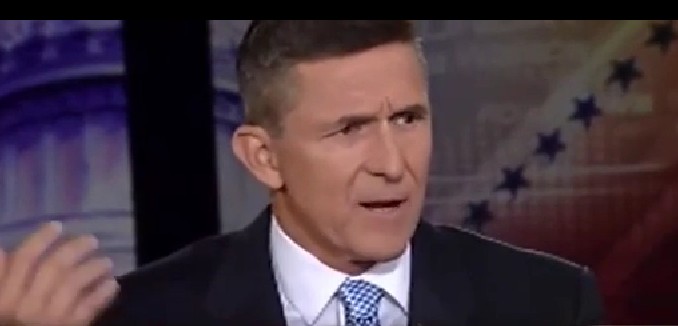Lt. Gen. Michael Flynn, the former head of the Defense Intelligence Agency, blasted the emerging nuclear deal with Iran as “wishful thinking” in his testimony before the House Foreign Affairs Committee on Wednesday.
Fox New reported:
“It is clear that the nuclear deal is not a permanent fix but merely a placeholder,” he told a House Foreign Affairs subcommittee.
In written and delivered testimony, he said the 10-year timeframe on parts of the deal “only [makes] sense” if the U.S. thinks a “wider reconciliation” with Iran is possible. He called this “wishful thinking,” adding that “regime change” is the best way to stop Iran’s nuclear weapons program.
Flynn also asserted that Iran has “every intention” of building a nuclear weapon, and their desire to destroy Israel is “very real.”
The House Foreign Affairs Committee website published Flynn’s prepared testimony (.pdf). While Wednesday’s hearing was about Iran’s ballistic program, at the beginning of his testimony Flynn offered twenty observations about the ongoing nuclear negotiations as well as the threat Iran presents to the Middle East. A few of his observations are presented below.
- Iran’s stated desire to destroy Israel is very real. Iran has not once (not once) contributed to the greater good of the security of the region. Nor has Iran contributed to the protection of security for the people of the region. Instead, and for decades, they have contributed to the severe insecurity and instability of the region, especially the sub-region of the Levant surrounding Israel (i.e, Southern Lebanon, Gaza, and the Border region along the Golan Heights on the Syrian side of the border).
- Iran killed or maimed thousands of Americans and Iraqis during our fight in Iraq during the period of 2003 to 2011, and since 2005, they have also provided limited support to the Taleban and the Gholam Yahya Front in Herat. Although the International Coalition of Nations in Iraq defeated AQ in Iraq, and despite Iranian support to AQ and Shia militias’ attempts to disrupt our joint efforts to win the fight in Iraq—this has all now been squandered.
- There is also the matter of incomplete verification. Iran’s leaders made it clear the furthest they will go is to allow International inspectors (IAEA) only “managed access” to nuclear facilities, and only with significant prior notification. This makes it nearly impossible, as a matter of full transparency, to have real “eyes on” the state of Iranian nuclear development to include their missile program.
- The notion of “snap back” sanctions is fiction. The Iranian regime is already more economically stable than it was in November of 2013, while the international sanctions coalition that brought Tehran to the table in the first place is showing serious signs of strain. It’s unreasonable to believe that under these conditions we will be able to put the “Regime Sanctions Team” back together again.
- Iranian rogue state behavior is on the rise and increasing. Parallel to its nuclear dialogue with the west, the Islamic Republic has stepped up its destabilizing activities in its neighborhood. This includes massive support for the Assad Regime in Syria, as well as backing for Yemen’s Shi’ite Houthi rebels, covertly supporting the Taleban in Afghanistan, actively advising, assisting, and accompanying Iraqi Shia militias inside of Iraq, maintaining pressure in Lebanon, and they continue to provide weapons and other arms to Hamas in the Gaza.
- From the beginning, our friends, partners and allies in the region were left out of the Joint Plan of Action (or P5+1) discussion. They simply wanted to be updated along the path of these talks and they were not (in any sort of coherent or cohesive manner). This latest attempt at a GCC summit was embarrassing for the United States. Obviously, this leaderless turnout with no serious long term, strategic agreement or framework for security coming out of the summit, you get less than acceptable results. Lesson relearned, you don’t bring Arab nations together without the deal already being agreed to.
- It is clear that the nuclear deal is not a permanent fix but merely a placeholder. The ten year timeframe only makes sense if the Administration truly believes that it is possible for a wider reconciliation with Iran that is likely to occur, which will make the Iranian regime change its’ strategic course. That’s wishful thinking.
Flynn served as director of the Defense Intelligence Agency under President Barack Obama from 2012 until last August.
[Photo: Kenda Woodwo / YouTube ]




